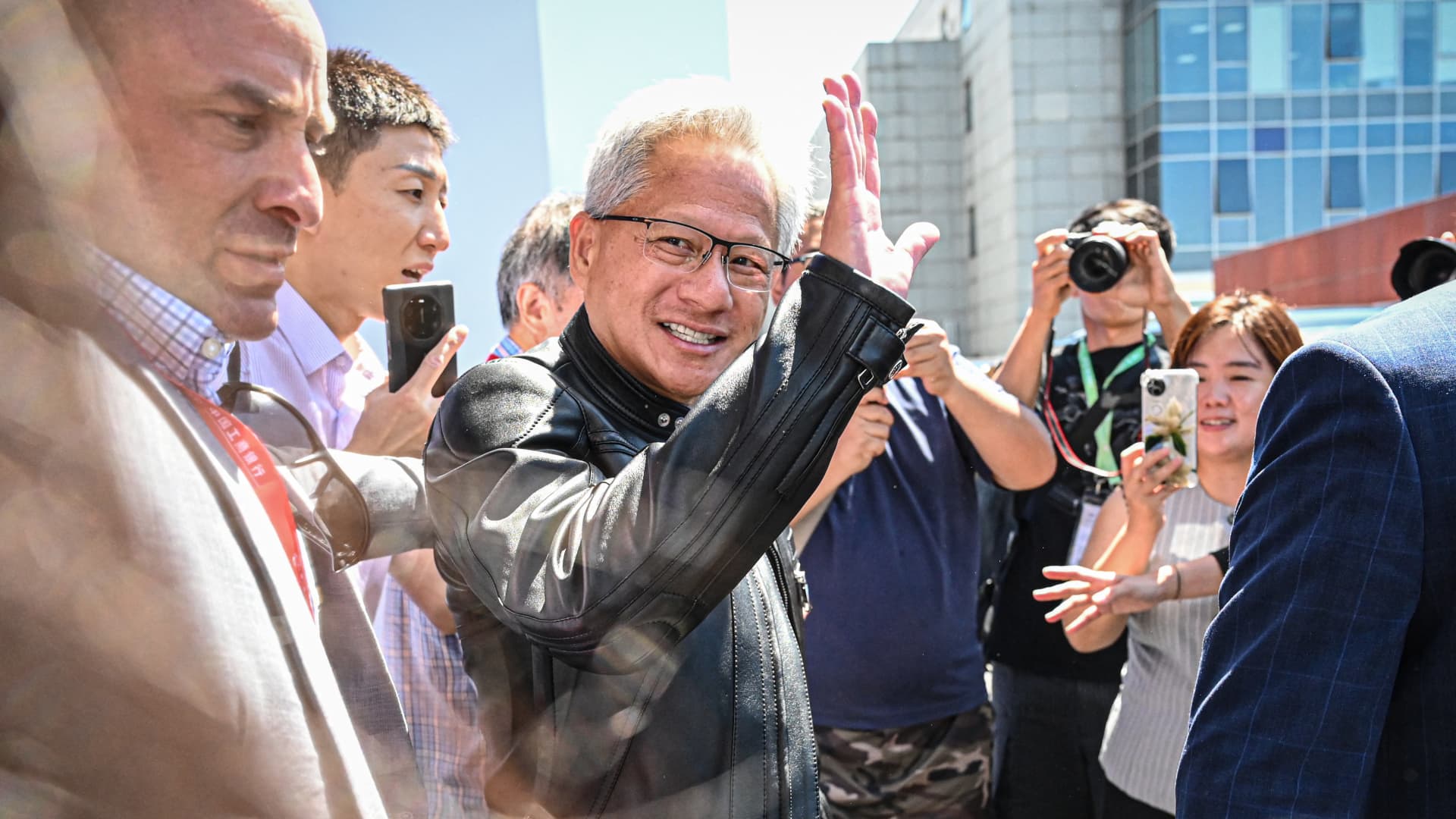Nvidia CEO Jensen Huang waves to a crowd as he leaves the China International Supply Chain Expo (CISCE) in Beijing on July 17, 2025.
Jade Gao | Afp | Getty Images
Nvidia CEO Jensen Huang said there’s a “real possibility” the company brings its advanced Blackwell processor to China as he urges the U.S. government to open up access for American chipmakers.
He also predicted the artificial intelligence market in the world’s second-biggest economy will grow 50% next year.
“The opportunity for us to bring Blackwell to the China market is a real possibility,” Huang said on Wednesday in a call for Nvidia’s latest quarterly results. “We just have to keep advocating the importance of American tech companies to be able to lead and win the AI race, and help make the American tech stack the global standard.”
Huang personally visited the White House in July and August to secure export licenses for Nvidia’s current-generation chip for Chinese AI, called the H20. In August, the White House announced that President Donald Trump and Huang had struck a deal in which Nvidia would receive export licenses in exchange for 15% of China sales of the H20 going to the U.S. government.
After the meeting, Trump said he was open to making a deal for Blackwell chips, which is Nvidia’s latest AI technology that currently comprises the majority of its data center revenue.
Huang has said that it is better for Chinese AI developers to use Nvidia’s chips rather than force them to use homegrown Chinese options by preventing exports, which could incentivize the Chinese tech industry to catch up.
If Nvidia were to release a Blackwell chip in China, it could spur a large amount of sales as Chinese AI developers opt for the most powerful chips available. Nvidia would have to modify its Blackwell chips for the U.S. market to make them slower in certain aspects in order to comply with U.S. export regulations.
“The Blackwell is super-duper advanced. I wouldn’t make a deal with that,” Trump said in August, before adding that it was possible to make a deal for a “somewhat enhanced in a negative way” version of Blackwell.
Huang’s bullish comments on Wednesday come after the company reported second-quarter year-over-year revenue growth of 56% to $54 billion, despite not selling a single H20 chip to China during the quarter. Nvidia said it released $180 million in H20 inventory to a customer outside of China, which accounted for $650 million in sales.
Nvidia said it is not counting on any H20 sales in the October quarter as part of its forecast for $54 billion in revenue, but that the company could sell between $2 billion and $5 billion in H20 chips, depending on the geopolitical environment.
“If we had more orders, we can build more,” Nvidia finance chief Colette Kress said on the call with analysts.
Nvidia said that while it had received some licenses after the meeting with Trump, the U.S. government has yet to publish official regulations outlining how its cut of sales will work.
“USG officials have expressed an expectation that the USG will receive 15% of the revenue generated from licensed H20 sales, but to date, the USG has not published a regulation codifying such requirement,” Kress said.
Huang told analysts that China is the second-largest AI market in the world.
“The China market I’ve estimated to be about $50 billion of opportunity for us this year, if we were able to address it with competitive products,” Huang said. “And if it’s $50 billion this year, you would expect it to grow, say, 50% per year.”
Recent reports have indicated that the Chinese government is encouraging AI developers to use homegrown chips over those from Nvidia.
“We’re still waiting on several of the geopolitical issues going back and forth between the governments and the companies trying to determine their purchases and what they want to do,” Kress said.
WATCH: Nvidia sales drop more than 4% as chipmaker says no Q2 H20 sales to China-based customers

Source link
#Real #possibility #Nvidia #brings #Blackwell #chip #China
